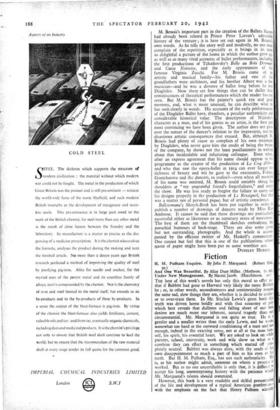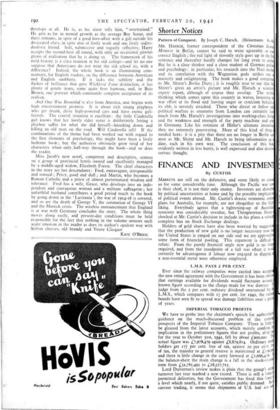Fiction
H. M. Pulham Esquire. By John P. Marquand. (Robert Hale.
9s-)
And One Was Beautiful. By Alice Duer Mi ler. (Methuen. 75. 6d1 Under New Management. By Naomi Jacob. (Hutchinson. 95.) THE best of this week's novels has only this moral to offer us: that if Babbitt had gone to Harvard very likely the more Babbitt he ; or, in other words, secondrateness and sentimentality remain the same sad, slow things they are, whether it is decided to under or to over-train them. In Mr. Sinclair Lewis's great book this truth was driven home boldly and with that economy of PitY which best reveals that dullness and falling short of our best desires are much more our inherent, natural tragedy than Oct circumstantial. Mr. Marquand is not quite so true. He is 3 gentler and a smaller writer than the early Lewis, and he work' somewhat too hard at the outward conditioning of a man and riot enough, indeed in the exacting sense, not at all at the man him- self, his spirit, his essential heart. We are asked to look on while parents, school, university, work and wife show us what as combine they can effect in something which started off com- pletely neutral. Babbitt was always alive, with the seeds of his own disappointment as much a part of him as his eyes or his teeth. But H. M. Pulham, Esq., has not such authenticity. Ile is, as his author might admit, someone on whom a process is worked. But as no one uncertifiable is only that, it is difficult ro accept his long, unenterprising history with the patience which Mr. Marquand's talents should command.
However, this book is a very readable and skilful presentanos of the life and development of a typical American gentlernAw-- with the emphasis on the fact that Henry Pulham scare di develops at all. He is, as his sister tells him, " overtrained." He gets as far in mental growth as the average Boy Scout, and there remains, in spite of a good love-affair with a girl outside his desiccated class, in spite also of lively work and one lively indivi- dualistic friend. Soft, submissive and vaguely teflective, Harry accepts the second-best all round, with only an occasional piteous gleam of realisation that he is doing so. The framework of his mild history is a class reunion at his old college—and let no one suppose that Americans do not wear the old ,school tie, with a difference! Indeed, the whole book is an illuminating com- mentary, for English readers, on the difference between American and English snobbery. If it lacks the subtlety and the flashes of brilliance that gave Wick ford Point distinction, it has plenty of gentle irony, some quite firm humour, and, in Bojo grown, one portrait which commands complete acceptance of its realism.
And One Was Beautiful is also from America, and begins with high entertainment promise. It is about rich young playboys who get drunk, drive high-powered cars and have exotic girl- friends. The central situation is excellent: the little Cinderella girl knows that her lovely elder sister is deliberately rating a playboy suffer for what she did herself—knocking down and killing an old man on the road. Will Cinderella tell? If the combinations of the theme had been worked out with regard to the first elements of psychology, this might have been a lively bedtime book ; but the authoress obviously grew tired of her characters when only, half-way through the book—and so does the reader.
Miss Jacob's new novel, competent and descriptive, centres on a group of provincial hotels owned and excellently managed by a middle-aged widow, Elizabeth Forest. The chief characters in the story are her descendants: Fred, extravagant, irresponsible and sensual ; Percy, good and dull ; and Martin, who becomes a Roman Catholic and a priest of almost preternatural wisdom and tolerance. Fred has a wife, Grace, who develops into an inde- pendent and courageous woman and a militant suffragette ' • her unfaithful husband contributes a good period touch to the book by going down in the Lusitania '; the war of 1914-18 is covered, and so are the death of George V, the coronation of George VI and the Munich crisis. The wireless announcement that England is at war with Germany concludes the story. The whole thing moves along easily, and present-day conditions must be held responsible for the fact that nothing in the volume arouses such acute emotion in the reader as does its author's opulent way with Stilton cheeses, old brandy and Veuve Clicquot KATE O'BRIEN.



























 Previous page
Previous page